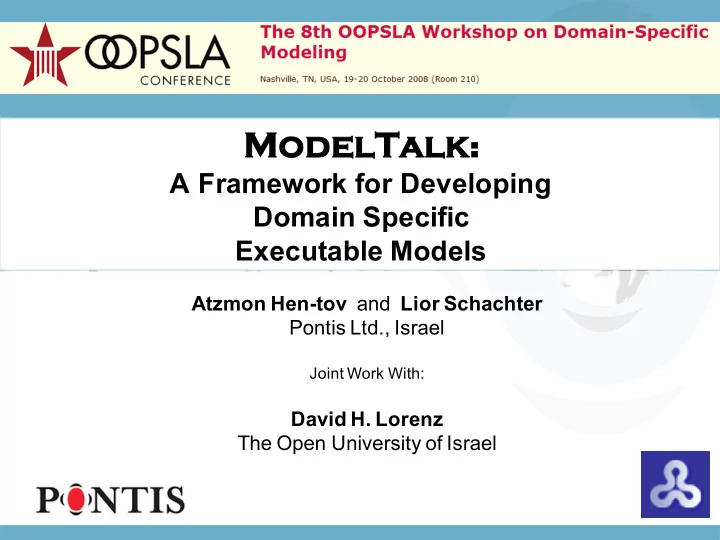

ModelTalk : A Framework for Developing Domain Specific Executable Models Atzmon Hen-tov and Lior Schachter Pontis Ltd., Israel Joint Work With: David H. Lorenz The Open University of Israel
The Challenge: Telco-grade Dependability with Extreme Agility • Telecommunications Business Support System (BSS) – Customers: Communication service providers – Product: Marketing delivery platform • Problem Space – Strict extra-functional requirements – Pervasive customization – Frequent updates • Solution Space – Third-party components (Main-stream J2EE technologies) – Domain-specific model-driven development – Product-line software engineering The Open University of Israel
ModelTalk Facts • Interpretive Approach – Short edit-execute cycle – Minimum changes to binary code – Meta-model changes are automatically reflected in the tool • Commercial Experience – 50 developers; >20 systems – 50 TPS/CPU. – Response time: 70 ms average, 250 ms 99% • Customization – Time and effort dropped by an order of magnitude – 82% declarative The Open University of Israel
Agenda Introduction ModelTalk Facts • The ModelTalk Approach • ModelTalk in Action • Conclusion The Open University of Israel
The ModelTalk Approach (1/3) Model (XML) Code (Java) - Structure and static state - Behavior - Instances, Classes, Meta-classes - ModelTalk managed Java classes Metaclasses Classes Instances The Open University of Israel
ModelTalk Dependency Injection (2/3) Model (XML) Code (Java) - Model Driven Dependency Injection - Model instances are constructed and injected into Java instances injection injection The Open University of Israel
ModelTalk Adaptability (3/3) Model (XML) Code (Java) - Mapping permits “holes” on the Java side - Holes enable Java-less model change process No Class “Hole” injection in Java injection The Open University of Israel
The ModelTalk Architecture Model Model sources processors Runtime platform Problems view constrains Auto completion Navigation views Model VM Consistent model Re-factor tools A B Problems view conforms Code VM Compiled code Auto completion Navigation views Re-factor tools Source Code code processors The Open University of Israel
Agenda Introduction ModelTalk Facts The ModelTalk Approach • ModelTalk in Action • Conclusion The Open University of Israel
ModelTalk in Action • Objective – Look and feel of the ModelTalk IDE • Example – Customizing the Pontis application for OOPSLA in less than 10 minutes… – OOPSLA Happy Hour promotion • $20 discount on selected OOPSLA tutorials during Oct 19-20, 2008. The Open University of Israel 10
Demo: Edit-Execute Cycle (1/2) Part I: The Programmer Perspective • Create a HappyHour instance • Add the HappyHour instance to the DB • Customize UI labels • Manipulate the HappyHour instance in the GUI Model-Code IDE Easier assimilation Model-compilation Controlled declarative changes Meta-object extensibility Meta-Data = Data The Open University of Israel 11
Model class : “HappyHour” Instance- of : “ HappyHourMeta ” ( metaclass) Extends : “ BusinessTemplate ” Class meta- data Field meta- data Modeling navigation views The Open University of Israel
The model contains dozens of metaclasses, thousands of classes and ten of thousands of instances. The Open University of Israel
Model instance : “OOPSLA_HH” Instance- of : “HappyHour” Extends (i.e., prototyping) : “ HappyHour_Base ” Auto-completion for attributes values, tag names, etc. Upon a change to the model, the compiler is invoked to perform cross-model validation. An incremental model change takes no more than a few seconds. Errors are reported in the IDE standard problems view. The Open University of Israel
A “Profile sheet” provides a comprehensive view of a model element. Inherited fields are displayed in gray color and fields that were defined in the model element are displayed in black color. The Open University of Israel
Technical DSLs are defined to improve the communication within the development team. The Open University of Israel
Demo: Edit-Execute Cycle (2/2) Part II: The Non-Programmer Perspective • Create new reference code Tutorial in the GUI • Create new OOPSLA event Tutorial purchase Event in the GUI • Send an event to the Pontis system and receive a discount Model VM Runtime modeling capabilities Interpretive Short cycle The Open University of Israel 17
Non-programmers modeling workbench is form based. Changes to the model are automatically reflected in: O/R mapping layer, GUI, External API (Web-Service). The Open University of Israel
The new (dynamic) model class can now be used in a business rule (just as a regular class) and influence the execution of the system. The Open University of Israel
Conclusion ModelTalk = MDD + Dependency Injection + Meta-modeling • ModelTalk integrates MDD, Dependency Injection and Meta- Modeling to form an interpretive, Domain Specific Modeling framework. The Open University of Israel
Thank You Talk : : A Framework for Developing ModelTa Domain Specific Executable Models Contact info: Lior Schachter, Atzmon Hen-tov, Senior Software Architect, Pontis Chief Software Architect, Pontis Ltd., Israel, liors@pontis.com Ltd., Israel, atzmon@pontis.com Professor David Lorenz, The Open University of Israel, lorenz@openu.ac.il The Open University of Israel
Recommend
More recommend